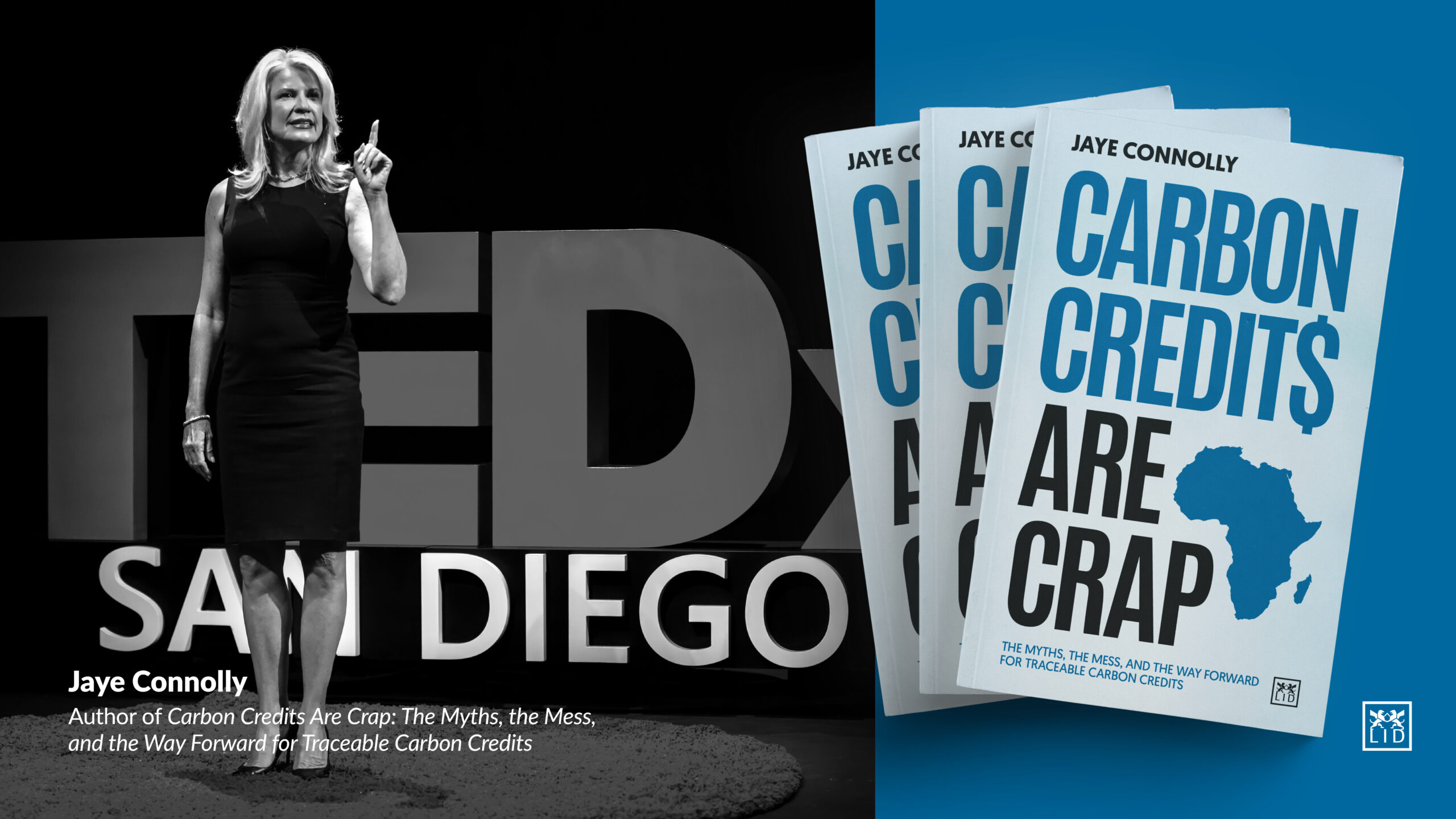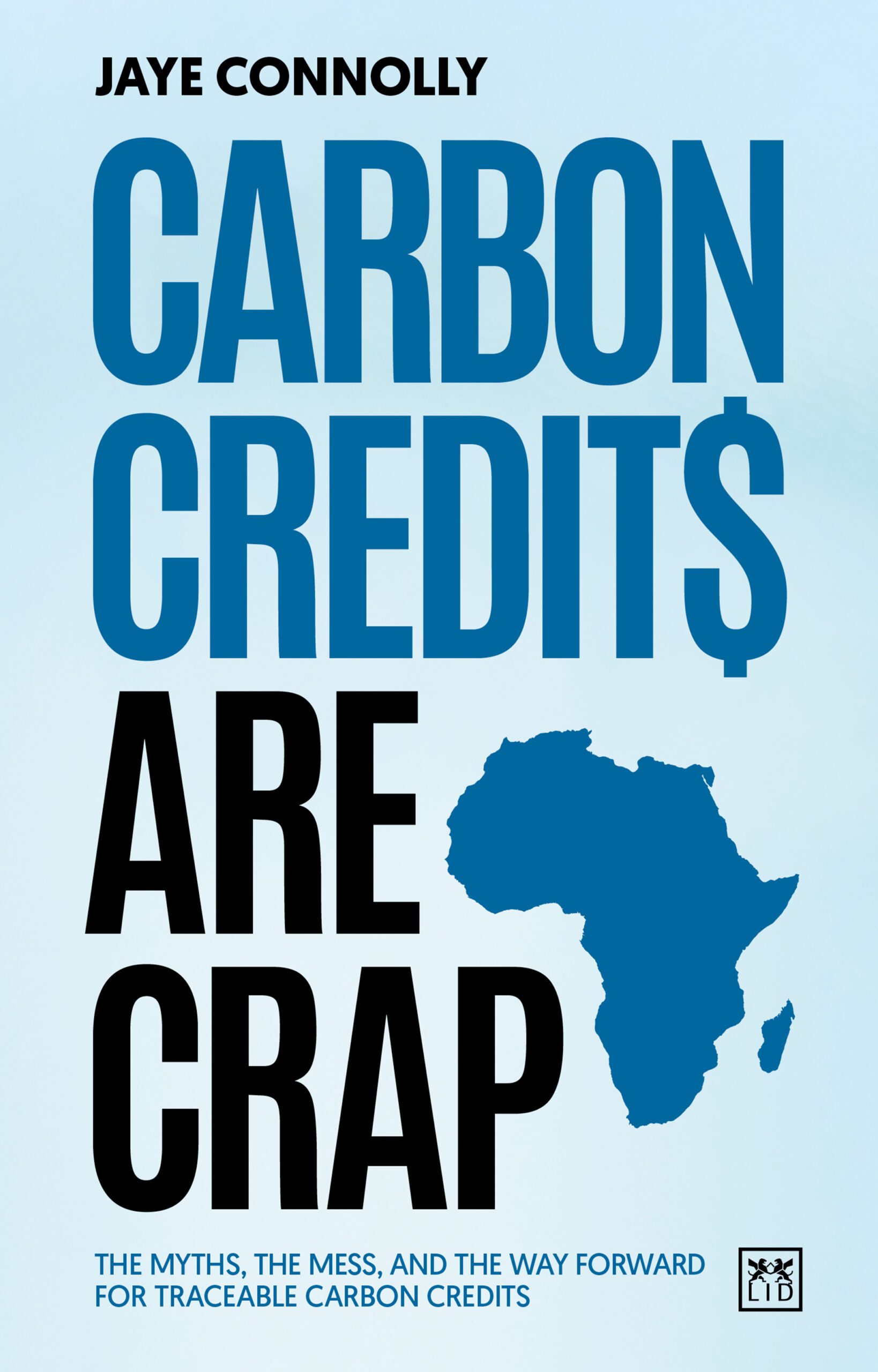|
How My Trip to Africa Exposed the Multi-Million Dollar Fraud at the Heart of Carbon Credits with Jaye Connolly
How My Trip to Africa Exposed the Multi-Million Dollar Fraud at the Heart of Carbon Credits

By guest contributor Jaye Connolly
Imagine this: a tree springs up somewhere in Africa for every puff of fossil fuel smoke released into the air. For the past 30 years, that has been the bold promise of carbon credits. But what if I told you that carbon credits are “crap”? I want to take you along on my 10,000-mile journey to the heart of Africa, where I searched for answers. Are carbon credits a genuine solution or merely a smokescreen?
Before diving into the tangled world of carbon credits, let’s start with some basic facts about Africa:
- Africa is the world’s second-largest continent and contains the Congo Basin, Earth’s second-largest rainforest after the Amazon.
- It is home to over 1.5 billion people across 54 countries, with 60% practising sustainable farming.
- Most of the population lives on less than a dollar a day.
- By 2030, Africa will have the world’s largest workforce—yet will bear the brunt of climate impacts it didn’t create.
Let’s demystify carbon credits, also known as carbon offsets. You’ve likely heard companies pledge to hit “net-zero” emissions by 2030 or individuals cutting plastic use and limiting air travel. Carbon credits allow companies and individuals to offset their pollution by funding projects in underdeveloped countries that either remove CO2—like planting trees—or reduce emissions through renewable energy like solar or wind. For every ton of CO2 offset, one carbon credit is generated and traded like stock in a booming $2 trillion marketplace. I call it the climate economy.
An article I read last year revealed that 90% of forest carbon credits were worthless. One African project had generated $100 million in carbon credit sales. According to the article, 30% of that revenue was supposed to go to the local communities protecting the forest. I thought, “Okay—bad for the climate, but at least the money helps the people, right?” What I discovered was something else entirely.
I’m not a climatologist. I’m the Chairman and CEO of a San Diego–based technology company, and for the past decade, I’ve worked across Africa helping governments build sovereignty through data-driven solutions. When I learned about the widespread fraud in deforestation-related carbon credit projects, it hit me hard. That’s when my professional focus turned personal.
I set off on a 10,000-mile journey to witness the real impact of that supposed $30 million in carbon credit revenue. In Mola, Zimbabwe—a village tied to the Kariba REDD+ project—I sat with Chief Mola and shared the article. His shock was immediate. “If we had €30 million,” he said, “this village would look like New York City.” Instead, I saw dry boreholes, crumbling buildings, and unmet promises. They needed basics: clean water, jobs, food, fuel, and education. None of it had arrived.
Next, I met with Zimbabwean government officials and told them a foreign company had made $100 million from their forests and promised €30 million to their people. Their outrage was raw. They’d never seen a cent. They felt deceived—again.
I wrapped up my investigation by meeting three key players in the carbon credit ecosystem:
- The project developers, focused on profit over sustainability.
- The standards bodies, struggling to enforce real-time monitoring and quality controls.
- The climate investors, often unaware of their projects’ true impact.
Each group insisted their projects were positive, verified, and compliant with strict international standards. But if the system is so airtight, why are 90% of forest carbon credits worthless? And why do communities see so little benefit?
Carbon credits should uplift—not exploit—local populations. Real reform starts with absolute transparency and traceability. Every credit should come with clear, verifiable proof of its environmental and social impact. And when companies discover they’ve been defrauded, they must speak up—instead of staying silent.
Underdeveloped communities face immense climate injustice. Solving it requires global cooperation—across governments, companies, and individuals. My mission is to expose the flaws, raise awareness, and advocate for a carbon system that truly works. Let’s stop the exploitation. Let’s demand impact. And let’s remember the chief and his village: ask questions, seek innovation, and take real action.
ABOUT THE AUTHOR
Suggested Reading
 For over 30 years, carbon credits or offsets have been sold as a climate solution – but behind the promises lies a system failing the world’s most vulnerable. In Carbon Credits Are Crap, Jaye Connolly exposes how this global climate market exploits rather than empowers. Drawing on decades of leadership and firsthand work in Africa, she reveals the truth behind the illusion. This eye-opening book demands transparency, accountability and a climate economy that puts people over profit. This book isn’t just an exposé – it’s a wake-up call for real, equitable climate action.
For over 30 years, carbon credits or offsets have been sold as a climate solution – but behind the promises lies a system failing the world’s most vulnerable. In Carbon Credits Are Crap, Jaye Connolly exposes how this global climate market exploits rather than empowers. Drawing on decades of leadership and firsthand work in Africa, she reveals the truth behind the illusion. This eye-opening book demands transparency, accountability and a climate economy that puts people over profit. This book isn’t just an exposé – it’s a wake-up call for real, equitable climate action.

 Jaye Connolly is a global technology leader driving transparency, traceability and economic independence across Africa. With over 40 years of executive experience in finance, tech, energy and healthcare, she has helped governments and communities leverage innovation to access the climate economy. Her TEDx talk, “Carbon Credits Are Crap,” ignited global conversations about fairness, accountability and inclusion in the $2 trillion carbon market. Connolly serves on international boards and leads initiatives to connect the unconnected and uplift underserved populations
Jaye Connolly is a global technology leader driving transparency, traceability and economic independence across Africa. With over 40 years of executive experience in finance, tech, energy and healthcare, she has helped governments and communities leverage innovation to access the climate economy. Her TEDx talk, “Carbon Credits Are Crap,” ignited global conversations about fairness, accountability and inclusion in the $2 trillion carbon market. Connolly serves on international boards and leads initiatives to connect the unconnected and uplift underserved populations